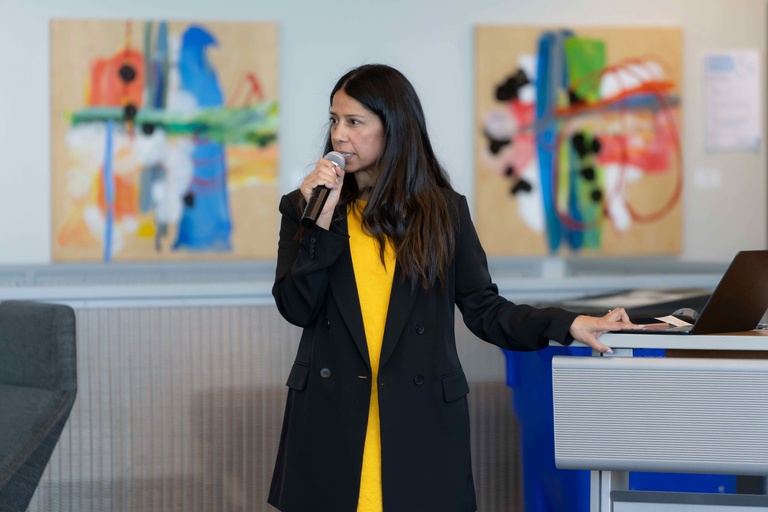The University of Iowa College of Education and UI Center for Teaching co-hosted the second annual Connecting K-12 and Higher Education Conference at the Kirkwood Regional Center April 25-26 in Coralville.
Nearly 100 people registered for the two-day event, sponsored by the UI College of Education, the UI Office of the Provost, and the Office of the Vice President for Research. Kirkwood Community College provided use of the Kirkwood Regional Center at the University of Iowa as the venue.
This conference brought together local stakeholders from K-12 education, the University of Iowa, and other educators from Iowa to share knowledge related to student learning, effective teaching, and innovative educational practices, according to Mark McDermott, UI College of Education associate dean for undergraduate education and educator preparation.
“It is such a great learning experience to have so many people from different backgrounds and working with students in so many different ways all together in one place thinking about ways to improve learning and teaching for all and sharing that information,” says McDermott.
Attendees included representatives from the Belin-Bank Center, Tippie College of Business, the UI College of Education Department of Teaching and Learning, Department of Sociology and Criminology, and Division of World Languages, Literatures & Cultures. Representatives on behalf of the Iowa City, Cedar Rapids, and West Liberty Community School Districts were also in attendance along with professors from Iowa State University.
Presentations, breakout groups, and workshops were provided during the event to encourage educators to engage and share ideas.
Saturday’s keynote address was delivered by College of Education alumna, Sara K. Ahmed, an internationally known speaker who spent time as a student teacher in Dublin, Ireland and a literacy coach in Bangkok, Thailand until 2020. Ahmed currently serves as director of curriculum integration and innovation and fifth-grade advisor at Catherine Cook School in Chicago. She is also an author of multiple publications that explore the philosophy of social comprehension, including "Being the Change: Lessons and Strategies to Teach Social Comprehension" and a coauthor of "Upstanders: How to Engage Middle School Hearts and Minds with Inquiry".

Her keynote address challenged educators to think about teaching pedagogies that center around the theme of constructing belonging.
“My goals in my personal education are to get more proximate with myself, kids, and mentors,” says Ahmed. “I think we have a structure in school that we’ve had for a very long time. I wonder today if that structure still matches the identities of the kids who are in front of us.”
Ahmed dissects the process of constructing belonging into three key facets: Soft Starts, Kid Watching, and Centering Identity. She asked attendees to understand these conditions that are required to co-construct belonging within constructivist models.
Ahmed explains that soft starts are a concept she learned from her time as a history teacher at a school in San Diego, California. The school removed passing periods from the bell schedule and allowed kids to show up as soon as they could. This helped eliminate the worry from teachers regarding issuing absences and tardies.
“What I learned is that learning does not begin at the sound of my voice,” says Ahmed. She pinpoints this as a turning point for herself as an educator.
She soon began to notice the students’ flight patterns when they entered her space. This helped her identify all of the internal and external loads that students carry with them on a daily basis. Ahmed emphasizes that soft starts are not intended to be activities, but are how a classroom comes together as a gathering space to create community.
“This is the first stage of creating belonging and helping students feel safe,” says Ahmed.
Ahmed guided attendees through multiple exercises to help demonstrate an understanding of the roles that educators directly have in constructing belonging within their classrooms. These activities provide internal awareness regarding the language that is used to describe students, and how this impacts the perception of their identity within the classroom.
“I echo Dr. P David Pearson and Dr. Peter Afflerbach when I say, I would like us to find a way to find common language around things in education so we can be a lot more precise about our arguments for education,” says Ahmed.
The event resulted in dozens of educators across the state of Iowa sharing their experiences and ideas to improve belonging and effective teaching in schools.
“I hope we were able to form some networks and connections among people who might be interested in working together to take projects and initiatives that have already been started to even greater levels,” says McDermott. “I think we were able to get the right people all together who really want to continue sharing ideas about learning and teaching at the K-12 and the higher education levels so that we can improve learning opportunities for all our students.”
